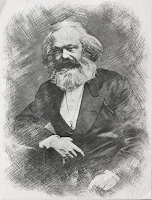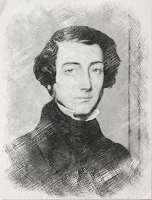In a recent email, someone stated, “Henry George was definitely NOT a Socialist. Quite the contrary. He wanted to untax labour and capital, treat land rents as the source of public revenue and restore the mediaeval system of financing the Crown through land rents.”
 |
| Henry George |
This statement was, we believe, in response to a recent blog posting on social credit, in which we referred to “Henry George’s agrarian socialism, presented in his 1879 book, Progress and Poverty.”
First, let us be clear on what socialism is. In common with Karl Marx and Friedrich Engels in The Communist Manifesto, we define socialism as the abolition of private property in capital. Anticipating your objections that land is not capital, and that Marx and Engels were communists, not socialists, in binary economics, we group all the non-human factors of production under the heading of “capital” and all the human factors of production under the heading of “labor.”
 |
| Karl Marx |
Admittedly, some people object to this, preferring to limit the term capital to manmade artifacts and land to that which God made. Others would limit capital to money and credit, what we would define as “financial capital.” I believe, however, that Louis Kelso’s division of the factors of production into human (labor) and non-human (capital) is consistent with the Thomistic personalism of Karol Józef Wojtyła (Pope John Paul II) that divides the universe into persons and non-persons, that is, into people and things.
As for the specific label that Marx and Engels chose for their version of “scientific” (i.e., non-religious) socialism, they debated what they should call their system. They chose the term communism because they felt that the followers of the utopian socialist Robert Owen had already coopted the term socialism. (John F.C. Harrison, Quest for the New Moral World: Robert Owen and the Owenites in Britain and America. New York: Charles Scribner’s Sons, 1969, 45.)
 | |
| Pierre Leroux |
Ironically, the term socialism was invented a pejorative by a socialist. Pierre Leroux, a Saint-Simonian, coined the term socialisme (“socialism”) in 1833/1834 to mean the opposite of individualisme. By 1847, however, Leroux noted that socialism had come to be used to describe every form of démocratie religieuse (Pierre Leroux, “De l’individualisme et du socialisme,” in Œuvres de Pierre Leroux (1825-1850) (Paris: Société typographique, 1850), 376) that is, “the Democratic Religion,” an early name for socialism, along with “the New Christianity” (Saint-Simon), “Neo-Catholicism” (de Lamennais), “Associationism” (Fourier), and a host of others.
The label “socialism” was so popular that Alexis de Tocqueville remarked that during the Revolution of 1848 in Paris,
 |
| Alexis de Tocqueville |
From the 25th of February onwards, a thousand strange systems came issuing pell-mell from the minds of innovators, and spread among the troubled minds of the crowd. . . . These theories were of very varied natures, often opposed and sometimes hostile to one another; but all of them, aiming lower than the government and striving to reach society itself, on which government rests, adopted the common name of Socialism.
Socialism will always remain the essential characteristic and the most redoubtable remembrance of the Revolution of February. The Republic will only appear to the on-looker to have come upon the scene as a means not as an end. (Alexis de Tocqueville, The Recollections of Alexis de Tocqueville. Cleveland, Ohio: The World Publishing Company, 1959, 78-79.)
We may legitimately assume, then, that despite some confusion, socialism and communism are equivalent terms, unless attempting to distinguish between the various types. Interestingly, although his latter-day followers are absolutely adamant that Étienne Cabet’s Icarian system is socialism, he was just as adamant in insisting that it was communism.
 |
| Étienne Cabet |
If we accept, then, the definition of socialism/communism as the abolition of private property in capital, we need to know what private property is. Property is not the thing owned, but the absolute natural right inherent in every human being to be an owner (the right to property, or the generic right of dominion), and the limited and socially determined bundle of rights that define how an owner may use what is owned (the rights of property, the universal destination of all goods).
Property is therefore not the thing owned, but the control that an owner has over what is owned. As Kelso said, “Property in everyday life is the right of control.” That means that property consists of the right to use something and the right to enjoy the fruits, the usufruct or income.
 |
| Wesley Hohfeld |
Consequently, as Wesley Hohfeld explained in Fundamental Legal Conceptions (1919), if A holds legal title to Blackacre (a generic name for a parcel of land, like “John Doe” for a human being), but conveys to B control and enjoyment of the fruits, then legally B is the owner of Blackacre, regardless of who holds legal title. Thus (for example) if private citizens hold legal title to land or anything else, but the State controls absolutely how they may use it or takes all the income from it, private property has been abolished and socialism (or communism, if you will) has been established.
That being the case, we can now look at Henry George’s proposal and determine whether he was a socialist, whatever he may have called himself or others may choose to call him. As stated on page 406 of the standard edition of Progress and Poverty, he declared,
What I, therefore, propose, as the simple yet sovereign remedy, . . . is — to appropriate rent by taxation.
In this way the State may become the universal landlord without calling herself so, and without assuming a single new function. In form, the ownership of land would remain just as now. No owner of land need be dispossessed, and no restriction need be placed upon the amount of land any one could hold. For, rent being taken by the State in taxes, land, no matter in whose name it stood, or in what parcels it was held, would be really common property, and every member of the community would participate in the advantages of its ownership.
Note that George did not say “appropriate some rent” or that the State would become one landlord among many. No, George was quite clear: the State would take all rent (and any other profits from land ownership) and become the universal landlord to the exclusion of all others: agrarian socialism.
 |
| Fr. Edward McGlynn |
Therefore, while we acknowledge that the correspondent is sincere in his belief that Henry George was “definitely NOT a socialist,” we are equally sure that he will appreciate and understand our conclusion that he definitely was a socialist, as stated in his own words. This is a conviction shared by the founders of the Fabian Society, George’s associate Father Edward McGlynn, and many others.
Admittedly, George himself insisted he was not a socialist. This was on the grounds that, in his opinion, socialism could only exist in barbarian or degenerate cultures. Interestingly, Edward Bellamy, author of the socialist classic Looking Backward, also insisted that he, Bellamy, was not a socialist.
So, although some people may continue to insist that Henry George was not a socialist, we assume that they will concede that we have sound reasons for stating that he was.
#30#
